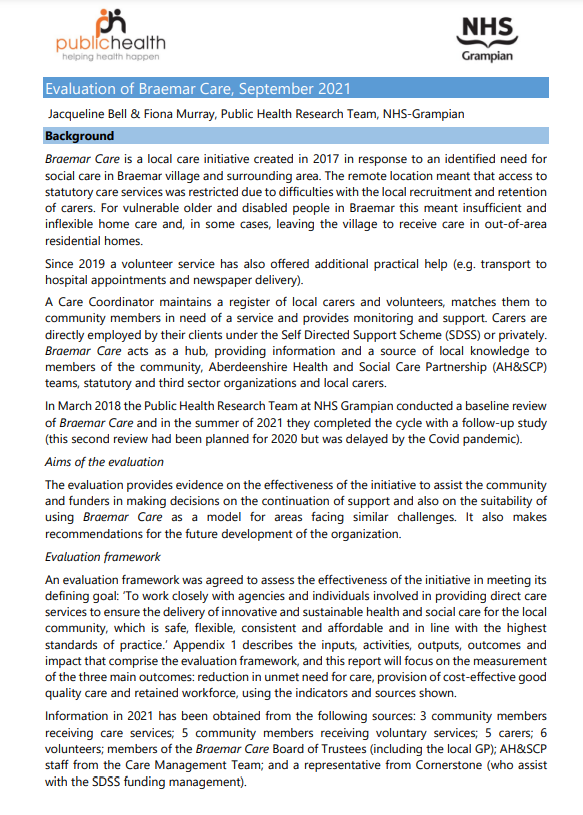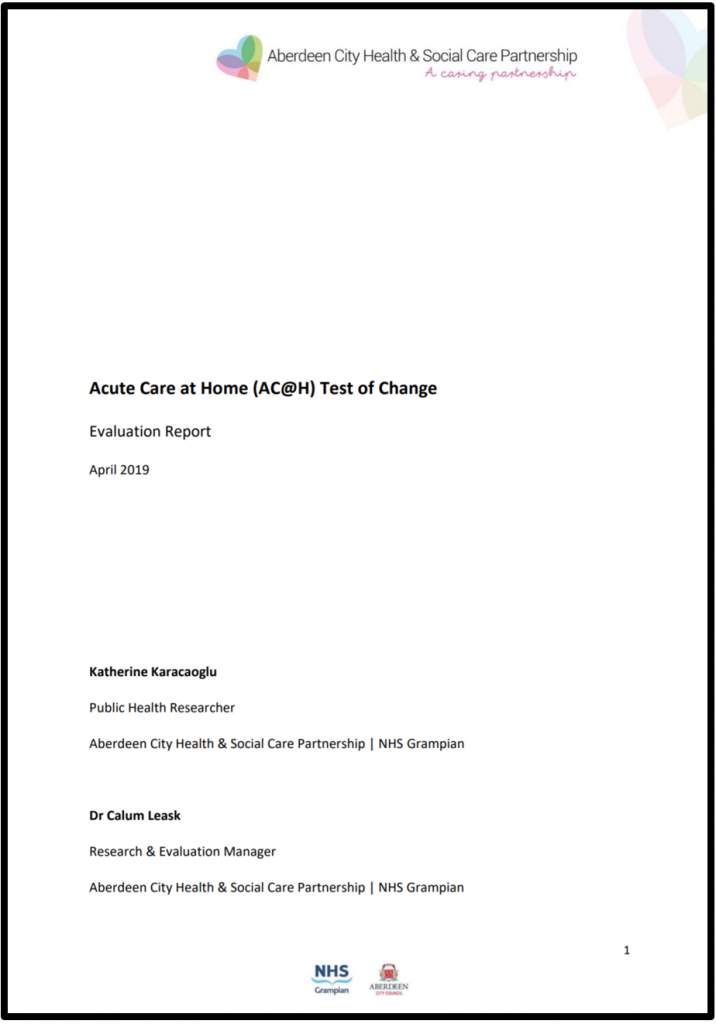Examples of Evaluations
Here are a selection of reports and presentations from evaluations the team have been involved in over the last few years. Please feel free to get in touch if you want more information on any of these, or the methods we used.
Examples
- Operation Home First
- Evaluation of Braemar Care, a local social care initiative
- Acute Care at Home Test of Change
- Modernising Primary Care
- Hackathons
- Elderly Care Nursing in Primary Care
- West Unscheduled Care Test of Change
The primary aim of this evaluation was to demonstrate the impact of the Operation Home First (OHF) priorities against the OHF aims. However, this evaluation also addresses further questions that have been posed to the Evaluation Working Group at recent committees (for example impact on costs and health inequalities).

Evaluation of Braemar Care, a local social care initiative
Braemar Care is a local care initiative created in 2017 in response to an identified need for social care in Braemar village and surrounding area. In 2021 an evaluation was conducted following up on baseline data collected by the team in 2018. The evaluation provides evidence on the effectiveness of the initiative in meeting three main outcomes: 1. Reduction in unmet need for care; 2. Provision of cost-effective good quality care; and 3. Retained workforce assist. The aim was to provide evidence to the local community and funders in their decisions on the continuation of support for Braemar Care, and on the suitability of using it as a model for areas facing similar challenges. It also makes recommendations for the future development of the organization.
Final Report

Acute Care at Home Test of Change
Acute Care at Home (AC@H) is a locally adapted ‘Hospital at Home’ model, where suitable patients can receive acute care, usually provided in hospital, in their own home for 1-7 days. The service was made up of a multi-disciplinary healthcare team and became operational in June 2018. The aim of this evaluation was to test model feasibility, understand perceptions of the service and to explore mechanisms integral for implementation and scalability. Patient data collected included: patient location 90 days following AC@H admission, re-admission rates, satisfaction questionnaire responses and two detailed case studies. Staff level data collected included a satisfaction questionnaire and semi-structured interviews. A satisfaction survey was also completed by unpaid carers and staff interacting with the service.
Modernising Primary Care
In October 2015, a new GP practice was established in Aberdeen that used a new model of primary care, introducing a wider multidisciplinary team: physician associate, advanced nurse practitioners and pharmacists working alongside the GPs and practice nurses. The purpose of this evaluation was to understand the effects of this new way of working on patients, staff, and interaction with wider healthcare systems. This evaluation used a patient survey, focus groups with staff, data from the practice IT systems and secondary care data.
Hackathons
What are the features of effective collaboration between public health experts and data scientists? Evaluation of a hackathon addressing society’s relationship with alcohol.
The aim of this evaluation was to identify factors facilitating collaboration at hackathons, intensive events bringing together data scientists (“hackers”) with experts from particular subject areas. Interviews were conducted with organisers and questionnaires were distributed to all participants asking about motivations, experiences and the usefulness of any outputs. Thematic analysis was used to identify key features of collaboration.
Elderly Care Nursing in Primary Care
The purpose of this evaluation was to provide local evidence on the effectiveness of the elderly care nurse (ECN) in caring for elderly primary care populations. The main objectives from the practice’s perspective were:
- To understand how practice has changed between practitioners (e.g. GP, practice nurse and ECN) and the effect it has had on individual workloads
- To assess the satisfaction of patients and their families with ECN care
- To understand the effect of the ECN post on other services and providers (e.g. hospital use, carers)
- To identify any aspects of the service that could be improved
The evaluation used a patient telephone survey, data from the practice IT Systems and secondary care data.
West Unscheduled Care Test of Change
This evaluation assessed an unscheduled care model test of change that involved an Advanced Nurse Practitioner (ANP) conducting unscheduled home visits on behalf of GPs in the West Locality of Aberdeen. Service-level data were collected per visit, including patient-facing time, visits by practice and outcome of visits. Practice staff and ANPs took part in mind-mapping sessions to explore perceived project benefits, barriers and implementation considerations. Patient questionnaires were distributed to determine overall satisfaction. Emergency admissions, bed days and A&E attendances were projected prior to implementation and compared to actual data to determine impact on hospital services.









